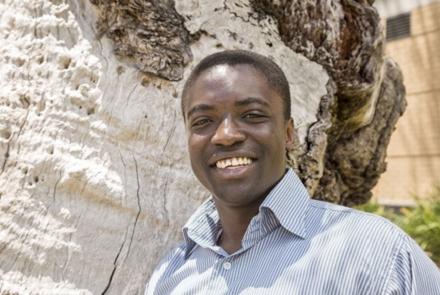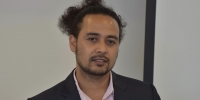
Appetite for change
Meet Kwame Agyei, a student in the Master of Climate Change program at Crawford School of Public Policy who is helping his home country Ghana see the wood for the trees and tackle devastating deforestation.
Kwame Agyei worked with the Forestry Commission of Ghana for five years before deciding to develop his knowledge of environmental policy with a master’s degree.
“Deforestation is a serious problem in Ghana. Conservative estimates put it at above two per cent loss of forests per annum, but I think it’s more than that,” he says. “It’s a serious challenge.”
Kwame chose a Master of Climate Change because, he says, it complemented his work experience and looked at environmental issues from a policy and economics perspective.
“It’s been a wonderful experience,” he says.
“I’ve met interesting people from all over the world, and we’ve shared knowledge and ideas as to what is actually taking place in their countries.
“I see my class as a mini United Nations. There are people from Nepal, Indonesia, Vietnam, Cambodia, Gambia, Uganda and Australia, of course. At times we found there are similar challenges, and sometimes divergences, with other countries and what they’re experiencing.
“I focused on climate change issues in developing countries, but I certainly know a lot about the Australian aspect now, and there is a strong focus on the Asia Pacific too. If other countries are doing something different and it’s working, then you can learn lessons that apply to your country. It’s always good to have a broader view.”
For the research component of the program, Kwame has studied the equity implications of the introduction of the scheme for Reducing Emissions from Deforestation and Forest Degradation (REDD+) in Ghana, but he has also taken courses as diverse as solar engineering and GIS.
“The program gives you the flexibility to explore what you want to learn,” he says, adding that his general skills of analysis have been greatly improved by the degree.
“Formerly I would just take issues on the surface, but now I’ve learnt that issues have so many dimensions and you need to understand them from every perspective before you draw a conclusion.”
Kwame says one of the best aspects of his master’s degree was the calibre of teaching staff, who have left a lasting impression.
“I’ve learnt from the very best,” he says. “Now I can email somebody who is the best in their field, and ask for feedback. If I’m faced with any challenges, there are people who are more experienced and knowledgeable than I am who I can draw on for support.
“The lecturers are very down to earth, approachable and they quickly reply to emails and inquiries. They are comfortable to share their knowledge with you. It was a real eye-opener because in Ghana it’s totally different!”
When asked what kind of student would benefit from completing the Master of Climate Change, Kwame doesn’t hesitate to reply.
“Everyone!” he says.
“Our globe is changing, our climate is changing and we need to take action. There are lot of important things to learn.”
Updated: 13 July 2024/Responsible Officer: Crawford Engagement/Page Contact: CAP Web Team













